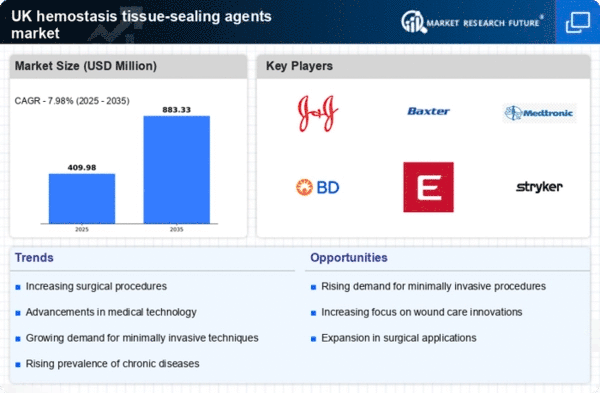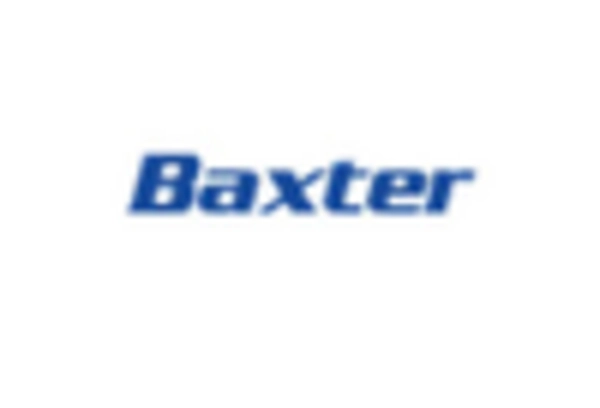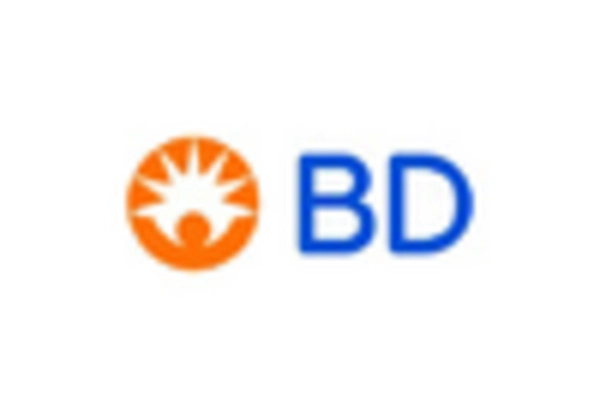Rising Surgical Procedures
The increasing number of surgical procedures in the UK is a primary driver for the hemostasis tissue-sealing-agents market. As the population ages, the demand for surgical interventions, including orthopedic, cardiovascular, and general surgeries, continues to rise. According to recent data, the UK healthcare system has seen a steady increase in elective surgeries, which has led to a heightened need for effective hemostatic agents. These agents play a crucial role in minimizing blood loss during operations, thereby enhancing patient outcomes. The hemostasis tissue-sealing-agents market is expected to benefit from this trend, as hospitals and surgical centers seek to adopt advanced solutions that improve surgical efficiency and patient safety. This growing demand for surgical procedures is likely to propel the market forward, creating opportunities for innovation and expansion within the industry.
Increased Focus on Patient Safety
Patient safety remains a paramount concern within the UK healthcare system, driving the hemostasis tissue-sealing-agents market. The emphasis on reducing complications associated with surgical procedures has led to a greater adoption of hemostatic agents that ensure effective sealing and minimize blood loss. Regulatory bodies and healthcare institutions are increasingly advocating for the use of advanced sealing technologies that enhance surgical outcomes. The hemostasis tissue-sealing-agents market is likely to see growth as hospitals prioritize products that align with safety protocols and improve patient care. Furthermore, the integration of these agents into surgical practices is expected to reduce the incidence of post-operative complications, thereby fostering a more robust market environment. This focus on patient safety could potentially lead to increased investments in research and development, further advancing the industry.
Regulatory Advancements and Approvals
Regulatory advancements play a crucial role in shaping the hemostasis tissue-sealing-agents market. The UK regulatory environment is becoming increasingly supportive of innovative medical products, facilitating faster approvals for new hemostatic agents. This trend is likely to encourage manufacturers to invest in research and development, leading to the introduction of advanced products that meet stringent safety and efficacy standards. The hemostasis tissue-sealing-agents market may benefit from streamlined approval processes, which could enhance competition and drive down costs for healthcare providers. As regulatory bodies continue to prioritize patient safety while fostering innovation, the market is expected to experience growth, with new entrants and established players alike seeking to capitalize on these favorable conditions.
Technological Innovations in Hemostasis
Technological innovations are significantly influencing the hemostasis tissue-sealing-agents market. The development of novel materials and advanced formulations has led to the creation of more effective sealing agents that cater to diverse surgical needs. Innovations such as bioactive agents and synthetic polymers are enhancing the performance of hemostatic products, making them more reliable in clinical settings. The UK market is witnessing a surge in research initiatives aimed at improving the efficacy and safety profiles of these agents. As healthcare providers seek to adopt cutting-edge solutions, the hemostasis tissue-sealing-agents market is poised for growth. The introduction of smart technologies, such as real-time monitoring systems, may also play a role in shaping the future landscape of the industry, potentially leading to improved surgical outcomes and patient satisfaction.
Growing Demand for Minimally Invasive Techniques
The trend towards minimally invasive surgical techniques is reshaping the hemostasis tissue-sealing-agents market. As surgeons increasingly adopt these techniques to reduce recovery times and improve patient comfort, the demand for effective sealing agents that can function in confined spaces is rising. Minimally invasive procedures often require specialized hemostatic agents that can provide rapid and reliable sealing without compromising tissue integrity. The UK healthcare sector is likely to see a continued shift towards these techniques, which may drive the development of innovative products tailored to meet the specific needs of minimally invasive surgeries. This evolving landscape presents opportunities for manufacturers to expand their product offerings and enhance their market presence within the hemostasis tissue-sealing-agents market.















